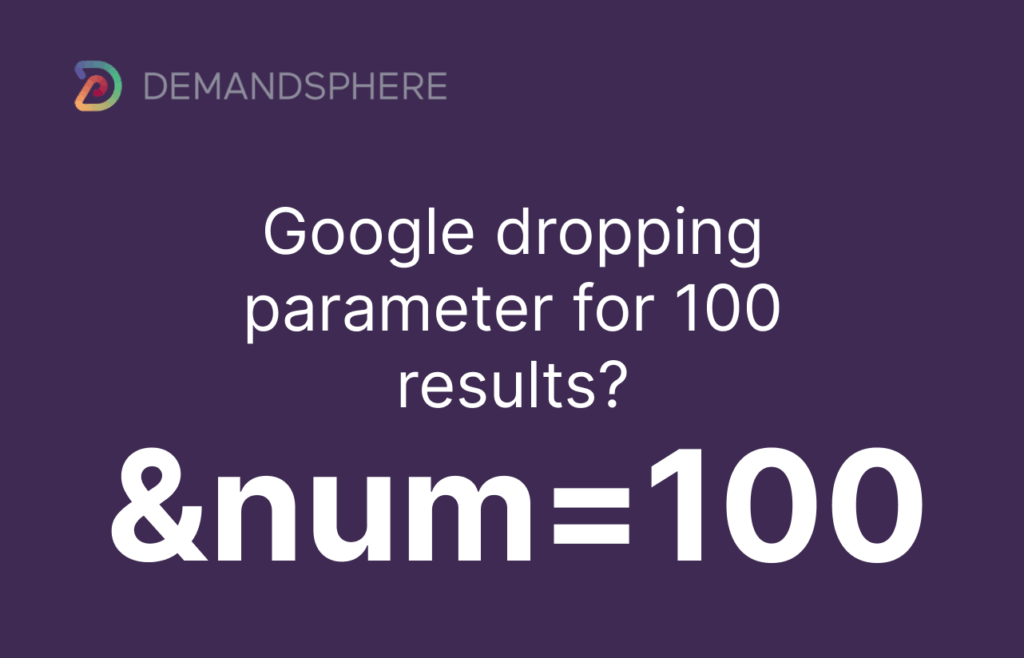
This year has certainly been an interesting one for SERP analytics providers.
In January, we had the SERPpocalypse. We recovered in about 18 hours due to our existing investment in browser automation and JS-based fetching.
As Barry Schwartz covered in his post on this topic, Google is testing dropping the 100 search results parameter.
What this means is that it is much more difficult to provide clients with the 100 results that they are used to seeing in their reporting.
It is not clear yet if this is a permanent change but my prediction is that it is likely here to stay.
Impact
Everyday searchers won’t really notice much of a difference but this is a pretty big deal in the world of SERP analytics.
Most SERP analytics SaaS providers such as ourselves at DemandSphere rely on the &num=100 parameter in order to provide the best view on the SERP index. Google has dropped this parameter in most cases now. Starting on Friday, September 12th, we noticed this in our data and provided an incident report to our clients.
In the short term, this will result in an appearance of rankings drops for those SERPs that were affected.
Our Response
We are implementing pagination capabilities in our SERP fetching process (which we do already for Bing, for 5 pages).
This will be ready within the next 24-36 hours and we will provide up to 10 pages for the next week in order to give everyone a chance to sort this out.
(Update 09/16/2025: our team is still working on the pagination solution, this is taking a bit longer than expected, further updates will be coming.)
(Update 9/21/2025): we’ve been mostly stable since Friday, focusing on the first 3 pages / top 30 results. We will be providing a longer update with our future direction this week.
Update 9/24/2025: we’ve arrived at a solution to fetch the top 5 pages daily by default, with the option to go deeper if needed, at no additional cost. Details here.
In the meantime, our users will notice fluctuations in their ranking reports. Once we have pagination fully implemented, we will be able to fetch 100 results, but this will create additional issues around costs and time to fetch all of the data.
We will re-evaluate this on September 20th to make our decision about next steps and will be sure to provide updates to our clients and audience along the way.
It is too soon to say what direction we will end up taking yet but rest assured that we will continue to provide updates. It is a good time to re-evaluate the value in going to 100 results when all of the click-through-rate (CTR) models across the industry don’t go deeper than the top 20-30 results.
On the pixel measurement side of things, we will be storing pixels at the individual page level.
Our most likely next step is that we will continue to merge these results together, subtracting out pixel height for headers and footers, and also note the page number of the SERP in the data so that people have more context on their paginated positioning.
Why is this happening now?
As I have mentioned in numerous places in the recent past, it is our view that “the index is the prize.”
This is a reference to the usage of both Google and Bing’s search indexes by LLMs (ChatGPT, Perplexity, Claude, etc.) via live retrieval to ground their results.
I spoke about this extensively at brightonSEO in the UK in April 2025, and my slides can be found here.
Long story short, SERP data, while heavily underappreciated, is some of the most valuable data on the planet right now. Google knows this, OpenAI knows this, anyone in the AI business knows this.
Google is likely annoyed that ChatGPT is scraping their SERPs because, as far as we know, there is no API relationship between OpenAI and Google. It would be surprising if there was one for a number of reasons.
So, my best guess is that Google is doing this as a further preventative measure against OpenAI and other competing LLM companies.
I don’t really think it will matter, ultimately.
The financial incentives in AI and also search and SEO (itself a multi-billion dollar market) are too high and there are too many smart people working on the problem of getting data from Google.
It’s a speedbump that, one way or another, we will collectively solve and we’ll just be continuing to work hard to add value to our clients knowing that there is always something else on the horizon.
